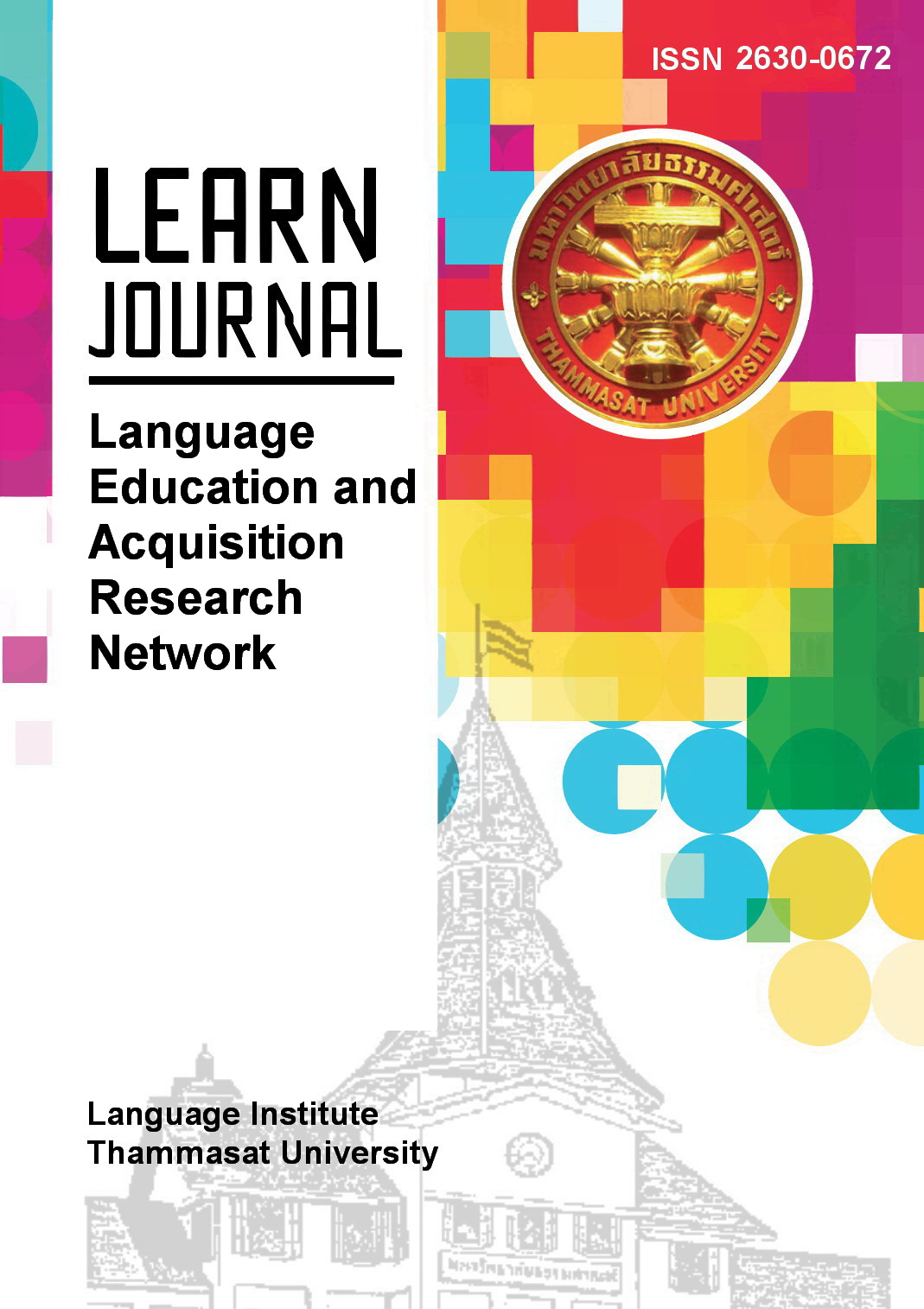Is Non-Standard English a ‘Broken Language’ or ‘Linguistic Innovation?’ Exploring Higher Education ELF Linguistic Features in Thailand's Deep South
Main Article Content
Abstract
The global prevalence of English as a lingua franca (ELF) across diverse linguacultural communities within the three circles invites an in-depth analysis of its phonological and lexicogrammatical features, especially among non-native English speakers. This qualitative study investigated these features among 30 Thai students from English and non-English programs, emphasizing natural occurrences in academic settings. Participants were directed to record audio and video during collaborative activities with peers and lecturers inside and outside the classroom. Through Conversation Analysis, findings revealed a significant divergence in the phonological and lexicogrammatical features of ELF participants compared to speakers of standard British English (BrE) and American English (AmE). Specifically, non-standard lexicogrammatical features concerning verb, noun, article, word choice, tense, and preposition emerged predominantly. Furthermore, common phonological deviations included omission of final consonant sounds, mispronunciation of the schwa sound, confusion in pronouncing the article ‘the,’ mispronunciation of words ending with ‘-ine,’ and substitution of /ʌ/ with /ɔ/. The data suggests widespread use of non-standard English norms, indicating linguistic adaptation beyond traditional boundaries in various environments. Significantly, this study contributes by highlighting how ELF participants reshape language for effective communication, prioritizing intelligibility over native-like proficiency, with insights extending beyond the Thai context, valuable for educators, linguists, and intercultural communication practitioners.
Article Details
References
Boonsuk, Y., Ambele, E. A., & McKinley, J. (2021). Developing awareness of Global Englishes: Moving away from ‘native standards’ for Thai university ELT. System, 99, 102511. https://doi.org/10.1016/j.system.2021.102511
Cogo, A., & Dewey, M. (2012). Analysing English as a lingua franca: A corpus-driven investigation. Bloomsbury Publishing.
Creswell, J. W., & Clark, V. P. (2011). Designing and conducting mixed methods research. Sage Publications.
Imperiani, E. D., & Mandasari, H. A. (2020). Lexicogrammatical features of ELF speakers in an Asian Students Association small talk in Indonesia. In 3rd International Conference on Language, Literature, Culture, and Education (ICOLLITE 2019) (pp. 346-352). Atlantis Press.
Jaroensak, T., & Saraceni, M. (2019). ELF in Thailand: Variants and coinage in spoken ELF in tourism encounters. rEFLections, 26(1), 115-133.
Jenkins, J. (2011). Accommodating (to) ELF in the international university. Journal of Pragmatics, 43(4), 926-936. https://doi.org/10.1016/j.pragma.2010.05.011
Jenkins, J. (2017). The future of English as a lingua franca? In J. Jenkins, W. Baker & M. Dewey (Eds.), The Routledge handbook of English as a lingua franca (pp. 594-605). Routledge.
Jenkins, J., Cogo, A., & Dewey, M. (2011). Review of developments in research into English as a lingua franca. Language Teaching, 44(3), 281-315. https://doi.org/10.1017/S0261444811000115
Kirkpatrick, A. (2007). World Englishes: Implications for international communication and English language teaching. Cambridge University Press.
Kirkpatrick, A. (2010). English as a lingua franca in ASEAN: A multilingual model. Hong Kong University Press.
Matsuda, A. (Ed.). (2017). Preparing teachers to teach English as an international language. Multilingual Matters. https://doi.org/10.21832/9781783097036
Mesthrie, R., & Bhatt, R. (2008). World Englishes. Cambridge University Press. https://doi.org/10.1017/CBO9780511791321
Nopjirapong, R. (2011). An analysis of article errors in Thai university student’s composition. Unpublished Master of Arts thesis, Srinakarinwirot University, Bangkok, Thailand.
O’Connor, C., & Joffe, H. (2020). Intercoder reliability in qualitative research: Debates and practical guidelines. International Journal of Qualitative Methods, 19, 1-13. https://doi.org/10.1177/1609406919899220
Peerachachayanee, S. (2022). Towards the phonology of Thai English. Academic Journal of Humanities and Social Sciences Burapha University, 30(3), 64-92.
Psathas, G. (1995). Conversation analysis: The study of talk-in-interaction. Sage Publications.
Rajprasit, K., Sirisuksakulchai, J., Srimontra, K., Pitakpornsin, N., Letakulkit, P., Phaiboontham, P., & Dumrongruedee, S. (2022). Using business English as a lingua franca for written and spoken communication: Challenges encountered by Thai human resources professionals in an American multinational company. 3L: Language, Linguistics, Literature, 28(4), 13-28. https://doi.org/10.17576/3L-2022-2804-02
Sahatsathatsana, S. (2017). Pronunciation problems of Thai students learning English phonetics: A case study at Kalasin University. Journal of Education, 11(4), 67-84.
Saraceni, M. (2015). World Englishes: A critical analysis. Bloomsbury Publishing.
Schneider, E. W. (2011). English around the world: An introduction. Cambridge University Press. https://doi.org/10.1017/CBO9780522781711
Seidlhofer, B. (2001). Closing a conceptual gap: The case for a description of English as a lingua franca. International Journal of Applied Linguistics, 11(2), 133-158. https://doi.org/10.1111/1473-4192.00011
Seidlhofer, B. (2009). Common ground and different realities: World Englishes and English as a lingua franca. World Englishes, 28(2), 236-245. https://doi.org/10.1111/j.1467-971X.2009.01592.x
Seidlhofer, B. (2011). Understanding English as a lingua franca. Oxford University Press.
Suntornsawet, J. (2022). A systemic review of Thai-accented English phonology. PASAA: Journal of Language Teaching and Learning in Thailand, 63, 348-370.
Tantiwich, K., & Sinwongsuwat, K. (2021). Thai university students' problems of language use in English conversation. LEARN Journal: Language Education and Acquisition Research Network, 14(2), 598-626.
Thienthong, A., & Uthaikorn, K. (2023). Thai learners’ attitudes toward English accents: Fields and stages of study. LEARN Journal: Language Education and Acquisition Research Network, 16(1), 676-702.
Trakulkasemsuk, W. (2012). Thai English. In E. Low & A. Hasmin (Eds.), English in Southeast Asia: Features, policy, and language in use (pp. 101-111). John Benjamin.
Trakulkasemsuk, W. (2018). English in Thailand: Looking back to the past, at the present and towards the future. Asian Englishes, 20(2), 96-105. https://doi.org/10.1080/13488678.2017.1421602
Trudgill, P., & Hannah, J. (2008). International English: A guide to the varieties of standard English. Routledge. https://doi.org/10.4324/9780203785225
Vettorel, P. (2020). Communication strategies in BELF: Implications for business English language teaching. Status Quaestionis, 2(19), 133-153. https://doi.org/10.13133/2239-1983/17131
Yuzawa, N. (2007). Teaching English pronunciation. The Economic Journal of TCUE, 50(1), 95-107.


